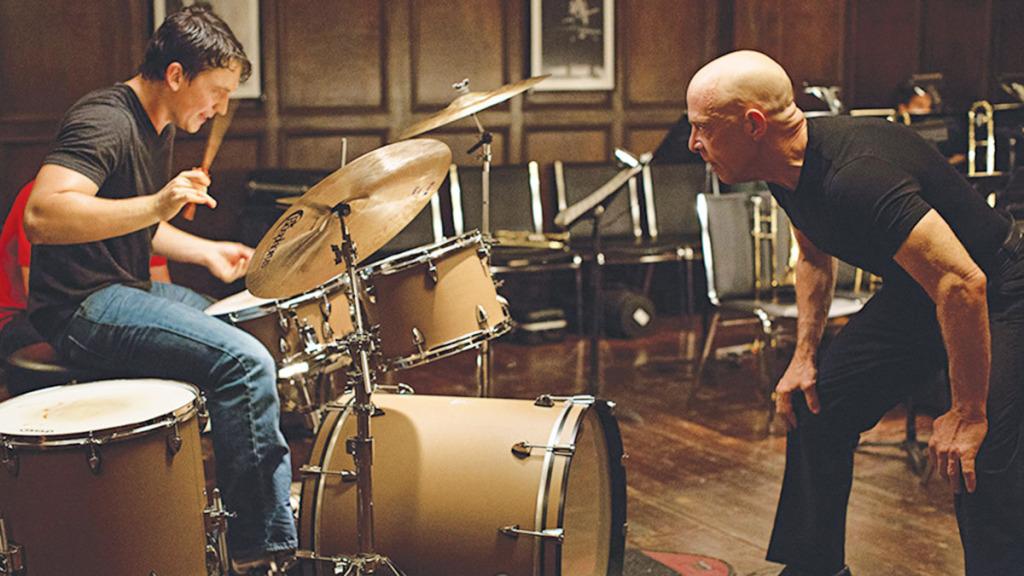Having locked himself away from friends and family in a dim studio, the young jazz drummer Andrew Neyman (Miles Teller) beats the hours away on a drum set. He flails and rattles endlessly, the drumsticks as extensions of his arms, until he has leaked half his weight in sweat onto the cymbals and his hands have bled through three or four Band-Aids. The only thing that matters to him is keeping the tempo, wowing the crowd and holding his position as core drummer for the legendary Terrence Fletcher’s (J.K. Simmons) top studio jazz band.
The beat goes on and on throughout Damien Chazelle’s “Whiplash” as the audience follows Neyman’s pursuit of jazz excellence, a battle hard-fought that earns him a spot at the Shaffer Conservatory, the premier music school in the country. His life consists of three things: drumming, frequenting movie nights at the cinema with his father (Paul Reiser) and a passing fling with Nicole (Melissa Benoist), the girl at the concession stand.
Neyman soon believes his shining moment has finally come when he is hastily chosen from his lesser jazz group by Fletcher and put in as the alternate drummer for Fletcher’s group. But minutes in, Fletcher’s studio is shown to be hell incarnate, and Fletcher a brutally unforgiving drillmaster of a teacher. Neyman’s first session sees Fletcher berating and intimidating him, manipulating his emotions, throwing a chair at his head for a slight mistake and furiously tearing away every notion that he’ll ever be a good drummer.
The two characters’ abusive relationship plays out to the sound of jazz, drums and deafening f-bombs. Fletcher’s Machiavellian tutelage pushes Neyman to limits further than he ever thought possible. It constantly rears its ugly head in nasty surprises when Fletcher gives Neyman inklings of approval, only to kick him down time after time. Fletcher always crafts new ways to test Neyman’s endurance and whether or not Neyman’s voracity is up to the challenge of playing alongside him. Neyman, however, never one to accept mediocrity, returns the favor by indulging in violent, obsessive drum practices that poison his family life and nearly destroy his body.
Teller and Simmons take the meaning of good acting and turn up the volume, swing it to a double-time beat and ring it loud for the whole audience to hear. Mastering Fletcher’s sheer ferocity seems to come easy to Simmons, whose name is sure to turn some heads at the Academy. From his foreboding visage to his trademark fist clench, he makes it clear that Fletcher will tolerate nothing short of musical perfection. Equally wonderful is his convincing act of pretending to be empathetic when hope seems lost for Neyman, which always ends horribly in a crude-but-eloquent shaming of his students, straight out of an angry ranter’s diary.
Likewise, Teller, with a smaller filmography than Simmons, demonstrates superior chemistry with everything and everyone. His negative and vain attitude toward other people’s petty pursuits, at times complementing his subtle descent into insanity against Fletcher’s angry tidal waves is visually stunning. Even alone in a room with nothing but a drum, he shows no mercy creating an entire scene by just beating tom-toms and snares with rising intensity.
A soulful and inspiring view on the dark underbelly of burning bridges to make perfect music, “Whiplash” is a must-see for all jazz musicians and drummers. The black of semiformal jazz wear and the faint golden glow of studio lights combine and light the screen for a fantastic two-man show that will have the audience leaving the theater with sweet sounds echoing in their heads.




















